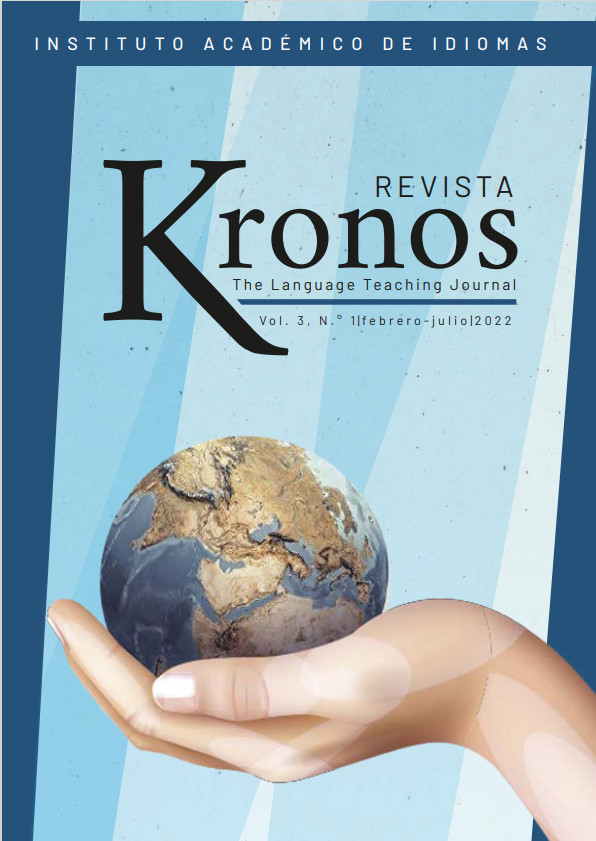Procesos de enseñanza-aprendizaje en línea y el papel de los profesores ecuatorianos de esl como facilitadores durante la pandemia: reflexiones y análisis (Quito, marzo 2020-noviembre 2021)
DOI:
https://doi.org/10.29166/kronos.v3i1.3545Palabras clave:
Covid-19, educación de esl, virtualidad, reflexiones, idioma, enseñanza, aprendizajeResumen
En 2019, el mundo fue atacado sin piedad por el covid-19 y sus variantes, sin mostrar signos de recesión hasta ahora. La pandemia transformó la vida de las personas en muchos aspectos, siendo la educación una de las áreas más sacudidas. Desde entonces, la educación virtual ha ocupado un lugar central en la mayoría de los países, la que ha llegado a miles de estudiantes de forma sincrónica o asincrónica. En países vulnerables como Ecuador, sin embargo, le costó despegar debido a los problemas socioeconómicos. No obstante, a pesar de las dificultades encontradas, algunas instituciones educativas fueron capaces de afrontarlo mejor que otras aplicando respuestas creativas en la transición de la educación presencial a la virtual. Se inauguró un tiempo de descubrimiento e intercambio educativo en algunas instituciones públicas de Ecuador, abriendo experiencias de aprendizaje renovadas a lo largo de la transición. Esta investigación cualitativa explora y analiza las reflexiones y percepciones de los estudiantes de una universidad pública de Quito sobre su experiencia de aprendizaje de idiomas en línea, evaluando el contenido del curso, el proceso de aprendizaje y el desempeño del profesor, entre marzo de 2020 y noviembre de 2021.
Descargas
Citas
Allen, M. (2017). The SAGE Encyclopedia of Communication Research Methods. University of Wisconsin-Milwankee.
Baskaran, K., Anant, S., Hamzea, N. & Li, A. (2020). Roles of Technology during COVID-19. Golden Meteorite Press, Edmonton.
Bautista, M., Hiracheta, R. & Raudel, A. (2014). El uso de material didáctico y las tecnologías de información y comunicación (TIC's) para mejorar el alcance academico. Ciencia y Tecnologia, 8-12.
Chase, C. W. (2021) Consumption-Based Forecasting and Planning. John Wiley & Sons, Inc. Hoboken, New Jersey.
Chirsjames1. (2019). Role of the Teachers in Online Classroom https://qs-gen.com/role -of-the-teachers-in-online-classroom
Enriquez, C. (2019). Aprendizaje del Inglés por medio de plataformas virtuales en el aula. RECIE, 6-8.
Gonzalez, E. (2021). Educación virtual y satisfacción estudiantil durante la Pandemia del COVID-19 en una universidad de Ecuador Universidad César Vallejo. Retrieved from Repositorio Digital Institucional: https://hdl.handle.net/20.500.12692/69339
Graves, K. (1996). Teachers as course developers. England: Cambridge University Press, 1996.
Gobierno Nacional de la República del Ecuador. (2021). Portal con información oficial sobre la pandemia que afecta a Ecuador. https://www.coronavirusecuador.com/estadisticas-covid-19/
Gobierno Nacional de la República del Ecuador. (2021). Portal con información oficial sobre la pandemia que afecta a Ecuador. https://www.coronavirusecuador.com/datos-provinciales/
Jong, E. & Stevens, D. (2022). Netter's Infectious Diseases – E-Book. Elsevier, Philadelphia-USA.
Koley, T. K., & Dhole, M. (2021). The COVID-19 Pandemic: The Deadly Coronavirus Outbreak. Routledge, New York-USA.
Marcillo, C. D. (2021). Student Experience In Virtual Education at the Central University. Revista de Investigación Enlace Universiatio, Volumen 20 (1) Enero-Junio, 10.
Metro. (2021, 12 10). La Universidad Central del Ecuador catapulta sus carreras virtuales gracias a la adquisicion de servidores de alta tecnología. Metro.
OECD & The World Bank. (2020). Panorama de la Salud: Latinoamérica y el Caribe 2020, OECD Publishing, Paris, https:doi.or/10.1787/740f9640-es.
Sistek, C. M. (2019). Exploring Online Learning Through Synchronous and Asyncronous Instructional Methods. Chandler National University, USA.
Sue, G. & Banister. M. (2021). Digital learner presence and online teaching tools: higher cognitive requirements of online learners for effective learning. Springer Open.
Unicef. (2021). Priorizar la educación para todos los niños y niñas es el camino a la recuperación. https://www.unicef.org/ecuador/comunicados-prensa/priorizar-la-educaci%C3%B3n-para-todos-los-ni%C3%B1os-y-ni%C3%B1as-es-el-camino-la-recuperaci%C3%B3n
Vaca, M. (2020). El poder y la peste: La llegada del coronavirus a Ecuador. Guayaquil-Ecuador.
Vermeer, A. (1992). 12. Exploring the second language learner lexicon. In The construct of language proficiency (p. 147). John Benjamins.
Publicado
Cómo citar
Número
Sección
Licencia
Derechos de autor 2022 Luis Enrique Aulestia Vallejo, Verónica Pizarro Aguirre

Esta obra está bajo una licencia internacional Creative Commons Atribución-NoComercial-CompartirIgual 4.0.












